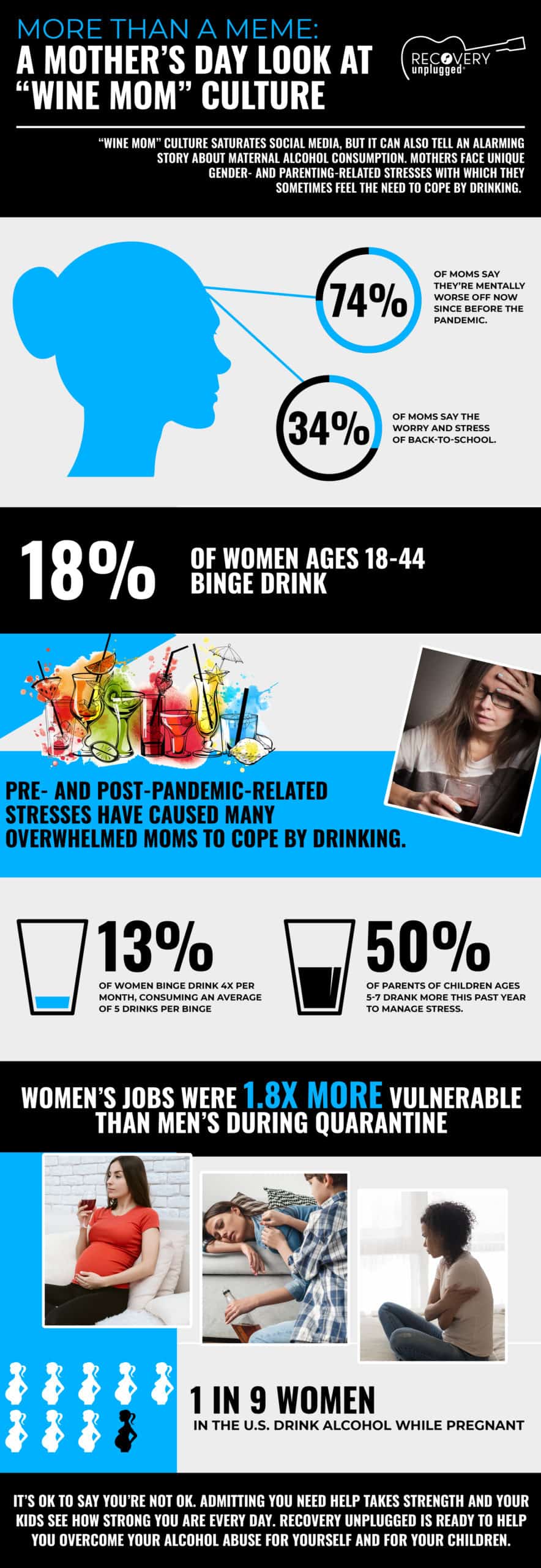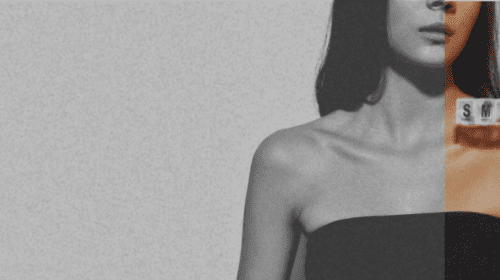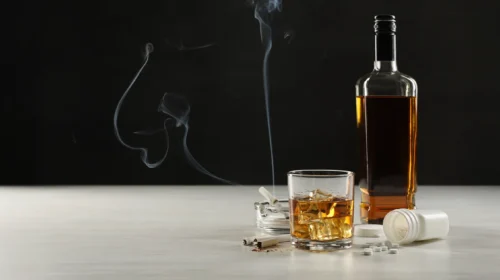Mother’s Day is just around the corner, but if you’re like many selected by the social media algorithm gods, your feed may be plastered with “Wine Mom” memes on any old day that ends in “y”. These sardonic and irreverent shareables usually represent an overwhelmed mother with biting captions that suggest and discuss using wine as a sort of coping mechanism; sometimes to deal with a bad boss, sometimes to deal with an inept spouse or partner, but most often to deal with the pains and perils of parenthood.
On their face, these images can be funny, raw, honest…and even a little empowering in the right context. They can signal to mothers that it’s OK to feel overwhelmed, frustrated, and even complacent after the most trying days. On the other hand, they can often tell a troubling story of the escalation of alcohol use and, in some cases, even be seen as a sort of cry for help if taken too far. The reality is that, like everything else, wine mom culture can be funny until it’s not, and it’s worth exploring the relationship between this phenomenon and genuine maternal alcohol abuse.
Glass Half Full, Glass Half Empty: The Difference between the “Wine Mom” and Mom Who Drinks Wine
Let’s start with the obvious reality that not all mothers who drink wine have a problem coping with parenthood. The “wine mom” identity as we’ve come to know it is not the same as the single executive and mother of four who pours herself half a glass a few nights per week to celebrate accomplishing, in both the workplace and in the home, what most of us can’t get done in a week. Nor is it the full-time, stay-at-home mom who looks forward to going out with her friends on the weekends and having a few cocktails. And guess what…it’s perfectly normal for people to joke about “needing wine” after the day or week they’ve had.
Here’s the thing, though: maternal alcohol consumption is up, both during and after pregnancy, and it’s very easy for people to use humor to mask their deepest vulnerabilities, especially where drinking is concerned. It can be argued that the marketing surrounding the wine mom persona is dangerous and destabilizing. Data from the Centers for Disease Control and Prevention (CDC) indicates that one in ten women in the US drinks alcohol while pregnant, and about four percent binge drink. In addition to these alarming numbers:
- The CDC reports that approximately 13 percent of adult women report binge drinking. Among these women, one in four does so at least weekly, on average, and one in four consumes at least six drinks during a binge drinking occasion.
- About 18 percent of women of childbearing age (aged 18–44) binge drink.
- Data from the Substance Abuse and Mental Health Services Administration (SAMHSA) indicates that in 2019, four percent of women overall and eight percent of women aged 18 to 25 years had an alcohol use disorder.
From a physiological standpoint, women who drink the same amount of alcohol as men in the same period tend to have a higher blood-alcohol level and the onset of effects is quicker and lasts longer. This makes women, in general, more vulnerable to tolerance and withdrawal than men.

Where Do “Wine Moms” Come From?
If you’ve noticed that we haven’t, for one sentence of this piece, discussed “wine dads”, you’re on to something. The gender-specific frustration surrounding parenthood faced by mothers, however satirically packaged, is real and has been for a long time. Part of the origin of wine mom culture is the “given” reality that women shoulder a glaringly disproportionate share of parenting responsibilities, up to and including during the COVID-19 pandemic. They have historically adjusted their careers to raise their family more than their male counterparts and when quarantine hit, they continued to leave their jobs and stay home more than men.
In addition to perpetuating the baked-in expectation that they put their ambitions on hold, the pandemic has had a disproportionate financial impact on women. For example, data from McKinsey and Company suggests that women’s jobs were 1.8 more vulnerable than men’s during the pandemic and that women were disproportionately affected by childcare and school closures. Women are simply more expected to be present in their children’s everyday lives. They also have the unique burden of postpartum depression, a condition closely linked with alcohol abuse, and high rates of anxiety, fatigue, and depression directly related to their caregiver roles.
Although moms get overwhelmed and exasperated, they truly love their children and, more often than not, put them first. As a result, they must constantly balance being a present caregiver, protecting their kids from harm, and trying, often in vain, hard to cultivate their own interests.
And Speaking of COVID…
As the pandemic has impacted working and stay-at-home mothers’ financial security and mental health, it’s also, by default, created the perfect storm for increased drinking. Between the constant ebb-and-flow of remote and in-person learning; having to simultaneously balance work with their child’s remote schooling; fear that they or their loved ones will contract the virus; and the rise of the virtual office happy hour, it isn’t hard to see how drinking among moms has increased during the COVID crisis.
When Does Wine Mom Culture Go Too Far?
There are multiple physical, behavioral, and psychological indicators that can bring an addiction problem to light. As a mom, some signs that your alcohol consumption has gotten out of control include, but are not limited to:
- Your binge drinking is escalating daily.
- You drink more than you should while caring for your children.
- You forget or neglect things like school functions, parties, play dates, and important events in your child’s life.
- You forget to pick up your kids from school or work because you were drinking.
- You’re lashing out at your family or isolating yourself from them.
- You drive your children around when you’re drunk or “buzzed”.
If you’re a mother and you feel like your drinking has gotten away from you, remember these four things: you’re NOT alone, you’re NOT a bad person, you’re NOT a bad mother, but you DO need help.
Getting Help for Alcohol Use Disorder as a Mother
Once you realize your alcohol consumption is interfering with your health, your family, and your quality of life, it’s natural to want to keep it a secret…it’s also very dangerous and will ultimately backfire in a potentially deadly way. Talk to someone you can trust and who you know will not judge you. If there’s another mom that you know who you feel comfortable talking to, confide in her about what you’re experiencing. Start researching Alcoholics Anonymous or SMART Recovery meetings in your area, or if you’re nervous to go in person, you can attend a virtual meeting. Start making plans to get into treatment.
Who Is Going to Take Care of My Kids If I’m in Treatment?
If you’ve gotten to the point at which you need treatment for alcohol abuse, the best thing you can do is get help. It’s important to realize that taking care of yourself IS taking care of your kids. There are outpatient treatment options that allow you to be home with your kids every day, but even if you need inpatient or residential treatment, getting care is the most important thing. See if you can have your children stay with a trusted friend or relative while you get the help you need and do the necessary work on yourself.
Where Do You Go From Here?
If wine mom culture is hitting a little too close to home for you, and drinking is starting to affect your relationship with your children, you may have not even seen it coming. Perhaps you started by having the occasional glass of wine here and there to relieve some stress then realized you needed it to get through the day.
However your alcohol abuse started, the time to get help is now. Various treatment options, such as Recovery Unplugged, are available for those struggling with alcohol abuse, offering different approaches and resources to address this issue. We offer multiple locations nationwide and are in-network with most major insurance providers to help make treatment more affordable and accessible. We offer a discreet, safe, supportive, and non-judgmental care experience, and a Family Program to help you start reconnecting with your children and partner in recovery. Contact us today to start your treatment and leave the “wine mom” life behind.

























